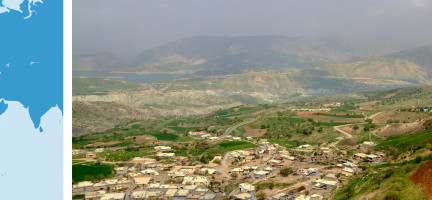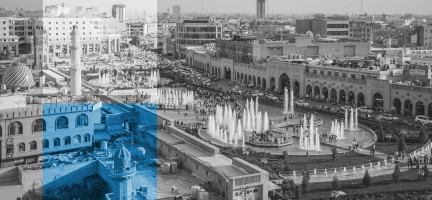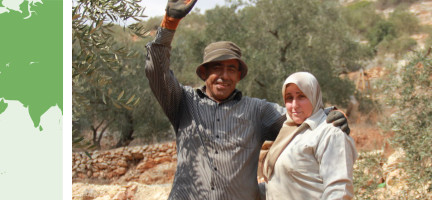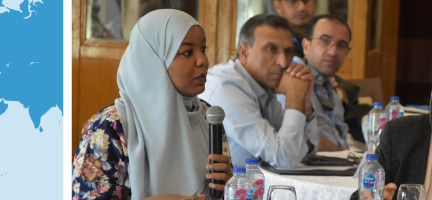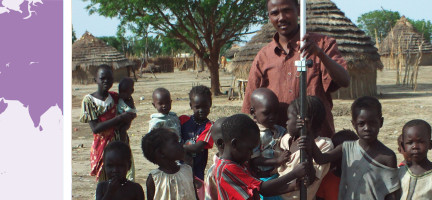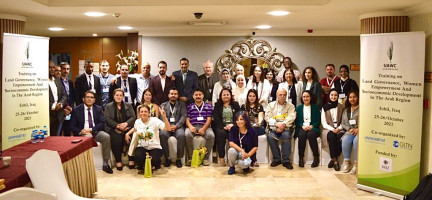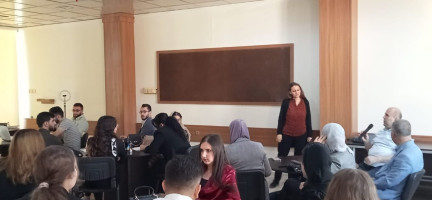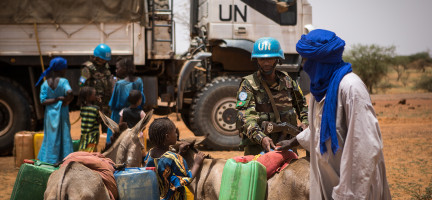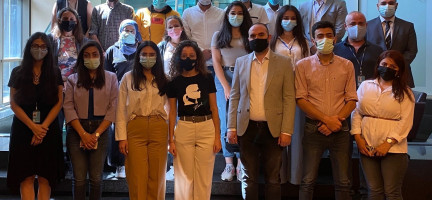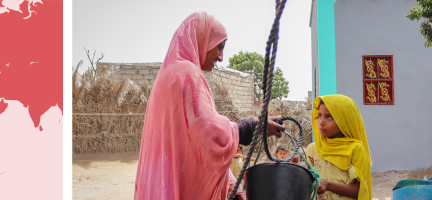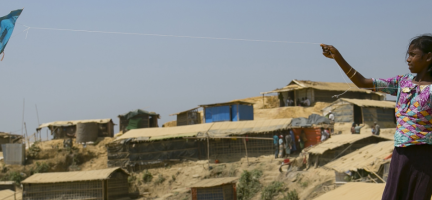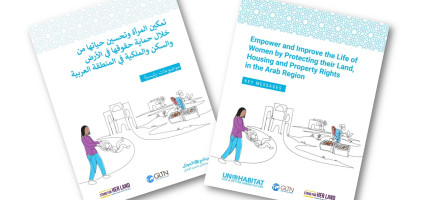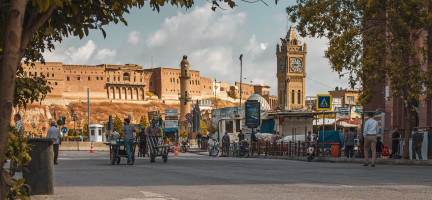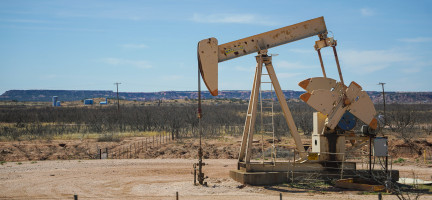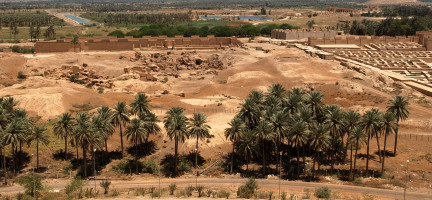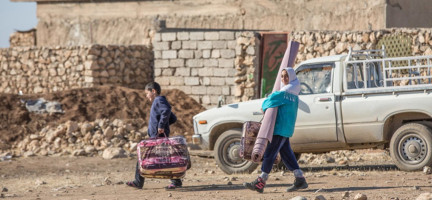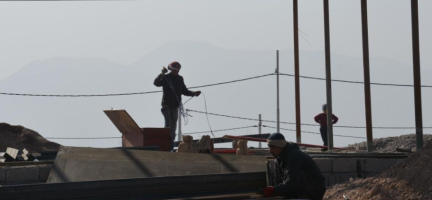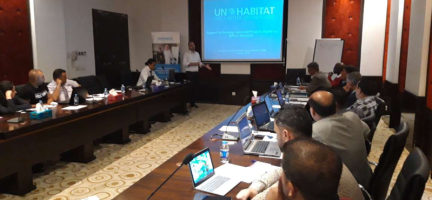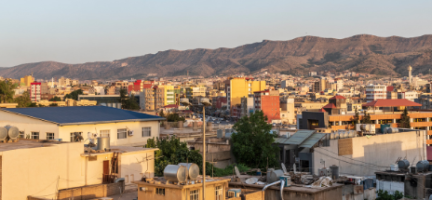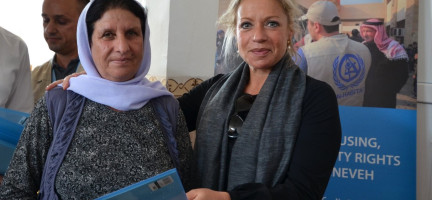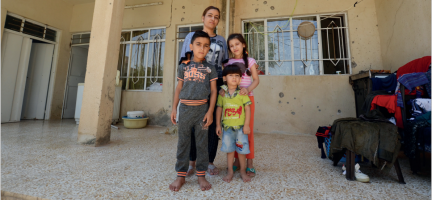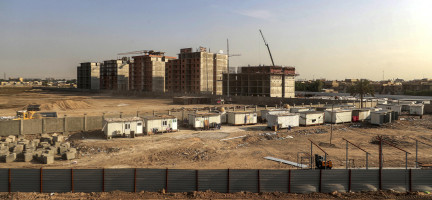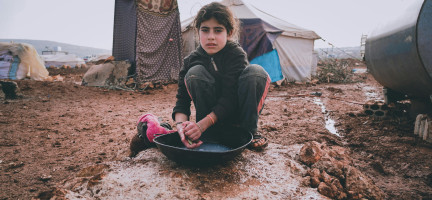Iraq
Iraq is one of the easternmost countries of the Arab Region. With Baghdad as its capital city, it is bordered to the north by Turkey, to the east by Iran, to the west by Syria and Jordan, and to the south by Saudi Arabia and Kuwait.
Iraq is a resource-rich middle-income country. In 2021, its population was estimated to be approximately 43,533,592 people, over 70 percent of whom live in urban areas, with a country area of 437,072 km2. The territory is defined by its position between two rivers, the Tigris, and the Euphrates. This location provided two major assets through history: fertile land and a strategic placement for trade. While these advantages made Iraq a “powerful engine of regional economic growth and trade, and a global beacon of culture and learning”[1], in more recent decades, the country has endured two successive Gulf wars, economic sanctions, a military intervention and internal conflicts. These have destroyed infrastructure and housing and led to large numbers of internally displaced people. Since 2011, Iraq also hosts hundreds of thousands of refugees from neighbouring Syria.
Political instability, centralized governance, imbalanced allocation of resources, and lack of investments in infrastructure, environment and social services have negatively impacted the country’s ability to develop its economy and support the needs of the population[2]. While Iraq’s land rights system has deep historical roots, the functioning of its land sector is now undermined by weak institutions and rule of law and by corruption. This affects the country’s capacity to achieve sustainable urbanisation and affects rural development.
Iraq faces significant housing, land and property (HLP) challenges. Tenure insecurity and the shortage of adequate housing – amounting to approximately 2 million units - are urgent concerns. Over 80 percent of agricultural land is state-owned, but inadequate land tenure legislation limits the development of the agricultural sector. For Iraq to achieve its potential and respond to the needs and aspirations of its population, modernising the land management and land administration system is of vital importance.
The information contained in this page gives an overview of the Iraq land sector. More detailed information, analysis, and full references can be found in the “Iraq Legislative and Administrative Land and Property Rights Framework” report developed by UN-Habitat and the Global Land Tool Network in the context of the Arab Land Initiative.
[1] United Nations (2009) Common Country Assessment for Iraq.
Legal and institutional framework
Iraq has a federal system consisting of the Kurdistan region - with three governorates and recognized as a federal region by the Constitution (Article 117/1) - and 15 other governorates. The local administrative level comprises of 251 municipalities.
The Iraqi legal and administrative framework is based on the civil law system mixed with Islamic law. Iraq’s present constitution was approved by referendum on 15 October 2005. Iraq’s legal system is based on its long legal tradition with some influence from western models. Like most Arab countries, Iraqi’s legal system is burdened by a vast array of regulations and administrative restrictions and numerous legal provisions are outdated[1].
The current land systems in Iraq are greatly influenced by social and political insecurity and multiple waves of forced displacement over recent years, which have contributed to land tenure insecurity and land use conflicts. Iraqi’s land legislation is conflicting and fragmented, being a mixture of Ottomans laws, British Mandate laws, dissolved Revolutionary Commands Resolutions, Coalition Provisional Authority regulations and laws issued by the Iraqi Parliament. This fragmentation is increasing. After the defeat of ISIS, Iraq is in the building and reconstruction phase, but the country neither has an Urban Planning Code like Syria’s (Urban Planning Law No. 5 of 1982) or Egypt’s (Unified Building Law No. 119 Year 2008), nor a Building Code.
The Iraqi Constitution of 2005 protects property rights, guarantees suitable income and appropriate housing, and provides that no Iraqi may be exiled, displaced, or deprived from returning to the homeland. It provides in Article 136 for the setting up of the IPCC, under the Council of Representatives (CoR), to address property claims arising out of the Baath Period, from 1968 to 2003. Although Iraq, after the defeat of ISIS, is in the building and reconstruction phase, the country has neither an Urban Planning Code nor a Building Code.
The Iraqi Government is organized into 22 ministries, ten of which, in addition to the Council of Ministers (CM), engage in land-related functions. The CM, presided over by the Prime Minister, issues State land allocation resolutions such as the resolution for the allocation of residential land for housing of individuals affiliated with social safety nets and with special needs, and charges relevant ministries with sorting lands for allocation. TheGeneral Directorate for Real Estate Registration (GDRER) in Baghdad coordinates the formation and operations of sub-offices of all governorates’Real Estate Registration Department (RERDs). They are responsible for all land registration in Iraq in accordance with Land Registration Law No. 43 of 1971 as amended. The State Property Department (SPD) is responsible for the inventory and management of State lands, and management of confiscated properties. The General Directorate for Survey (GDS) is the main governmental authority that represents the main source of all maps in Iraq. Governoratesalso have some important land functions.
Decentralization
Urban planning
Urban planning is based on several regulations, laws and legislations which were changed over time by conflicting resolutions that impeded their implementation. This led to a lack of control, poor urban planning and overlapping of responsibilities between executive departments and institutions. Powers and authorities overlap between the Federal Government and the local governments, which negatively impacts the overall planning, oversight, public participation and engagement of the private sector.
Urban planning is the responsibility of the General Directorate for Physical Planning (GDPP), a unit of the MoCHMPW. The GDPP prepares structure plans for governorates and master plans and detailed plans for cities and villages. Reclassification of land use is governed by regulations issued by MoCHMPW and the local Municipality Directorate. However, Baghdad is a special case and the Baghdad Governorate decides land use within its boundaries by developing and updating a Master Plan of the City of Baghdad (MPCB).
Although municipalities are responsible for implementing the urban plans according to the Law on Municipalities No. 165 of 1964, they have no access to revenue sources that could fund infrastructure, making it difficult to implement the plans.
Expropriation
The Iraqi Constitution of 2005 guarantees personal property rights. “Expropriation is not permissible except for public benefit in return for just compensation, and this shall be regulated by law” (Article 23, Second Paragraph). The expropriation of private property for higher public benefit is regulated by Law No. 12 issued in 1981, as amended by Law No. 6 issued in 1998. Article 62 of the Expropriation Law decided that compensation rules stipulated in this law prevail over and supersede any other compensation rules decided by other legislation. Although Iraqi Expropriation Law provides for some guarantees against unfair expropriation of private property, it does not define expropriation nor the concept of a “higher public benefit” that justifies the expropriation. This leaves them open for abuse. Moreover, Article 13/1 of the Expropriation Law made the judge who decides the expropriation request the head of the Valuation Commission, which contradicts the provisions of Article 91/5 of the Iraqi Civil Procedure Law and natural justice principles (Abed, 2018).
There is a need for coherence in the expropriation legislation and rules as well as adaptation of international standards such as Voluntary Guidelines on the Responsible Governance of Tenure (VGGT) Chapter 4.16 on expropriation.
[1] Amereller, Jäger and Al-Janabi, 2010
Women’s housing, land, and property rights
Land laws in Iraq are generally gender-neutral, but some rules on inheritance from the Personal Status Code and some customary rules discriminate against women and need to be reformed. However, while Iraqi women are legally permitted to buy and hold property under their own names, due to the current cultural, social and political situation, few women are able to exercise this right. Women also have full legal freedom to use their income and assets. They can open bank accounts in their names and receive bank loans or mortgages without the involvement of their husbands or male relatives. In practice, however, women are socially obligated to give up some or all of their income to help support their unemployed husbands and relatives. Women are also legally able to bid for and sign contracts without male involvement, and they can enter into business partnerships with men without major social restrictions. Still, they face obstacles, including the societal perception that men are better at running businesses, making critical decisions under pressure, and taking on the risk necessary to succeed. The 1959 personal status code guaranteed equal inheritance rights to men and women in most cases, but subsequent amendments restored the share of sons and husbands. Women face barriers to accessing legal services with regards to HLP rights. They face pressure to give up their inheritance in favour of brothers or other family members, and in some cases, male relatives will forge a woman’s signature or otherwise deceive the court to obtain her share. Even in cases where women are aware of their legal rights, they are often reluctant to bring the matter to the courts; they would rather resolve the dispute privately[4].
Thus, while HLP challenges affect the rights of all Iraqis who have lived through the conflicts, women are at a heightened risk, making it harder for them to access or claim their HLP rights, return home or seek other solutions to their displacement. In 2019, the Norwegian Refugee Council (NRC) found that displaced and conflict-affected women in Dohuk, Ninewa, Kirkuk and Anbar governorates are more likely to live in poor or inadequate shelter, report a greater fear of eviction and less ability to claim their HLP rights. Overall, 9 per cent of displaced women reported their property as occupied by community or tribal leaders, militias and security forces. Despite protection for women’s HLP rights in law, 43 per cent of Iraqis surveyed did not agree that women could own all types of property. One in five women surveyed stated that under Iraqi law, women were not entitled to property after a divorce and 18 per cent that they had no inheritance rights. One in three women said that in reality women received nothing following divorce and 23 per cent stated that they had no inheritance rights in practice[5].
Land Tenure
The structure of the land rights system in Iraq has deep historical roots, going back to the Hammurabi period. The current tenure system is significantly shaped by the Ottoman period, followed by the British mandate period, and is greatly influenced by conflicting policies and ideologies that control its programs and reforms. The Iraqi land tenure administration, in both rural and urban areas, is under the influence of conflicting policies and ideologies of the Iraqi state and of the religious rule.
Land in Iraq has traditionally been organized into categories derived from Sharia law and is currently regulated by the Iraqi Civil Code. Chapter 3 of the Iraqi Real Estate Registration Law n.43 of 9 March 1971 determines four types of property and ownership as follows:
- Mulk - privately owned land (article 5)
- Mawakoufa - endowed lands (article 6)
- Miri - land owned by the state (article 7)
- Matrouke – abandoned lands owned by the state with right of their use by local communities
In addition to the above, communal lands are those lands around a village that are commonly used by village members for activities such as grazing and firewood collection.
In the Ottoman period the land administration system, known as TAPU (title deed), provided for both deeds and a land register. In 1974, the Real Estate Registration Law replaced the TAPU system, establishing Real Estate Registration Departments (RERD) and creating an improved title-issuing service (in a paper format). In 2005, the Iraqi State Board for Agricultural Lands, with support from USAID, started working to create and implement an updated and secure digital system of land registration. Such a system is critical to the success of an emerging private agriculture sector in Iraq.
Through Law No. 53 of 1976 and the Agrarian Reform Law No. 117 of 1970, as complemented by Law No. 90 of 1975 related to Agrarian Reform in Kurdistan Region of Iraq (KR-I) as amended, the State nationalized practically all the agricultural land and now owns an estimated 80 to 90 per cent of all land in Iraq. The main challenges for State-owned land allocation are the lack of transparency, confusion about procedures and rules, overlapping responsibilities, lack of coordination among ministries and the lack of data and information about them. State-owned land is registered in the real estate registry, but there is no unified land inventory system for State-owned land. Different ministries and directorates have developed their own land database, mostly paper-based. However, lack of coordination between the relevant departments allows for encroachment and violations by contract holders on State land and property. Currently, the Iraqi State Land Inventory Committee (supported by the MoP) is working with UN-Habitat on the governorates’ State land inventory activity project, European Union-funded Local Area Development Programme (LADP‐EU), to improve State land inventory in Iraqi governorates. In 2018, a unified land inventory ‘model’ was developed in the governorates of Maysan and Najaf to assist local authorities in coordinating data collection and mapping of State‐owned land[6].
The agricultural land holding system is a mixture of owner-operator, leaseholder, and sharecropper. The size of land holding depends upon the type of land. Agrarian reform efforts since 1958 that expropriated land failed in redistributing land to small owner–operators, resulting in a fragmented system of lease arrangements between producers and the Ministry of Agriculture (MoA)[7]. The nature of ownership limits development of the agricultural sector. Land fragmentation due to land tenure change according to cultural rules, where holdings have become very small and uneconomical, is a major obstacle to increasing agricultural production.
The Real Estate Registration Office of the Ministry of Justice (MoJ) and the local Real Estate Registration Department (RERD) are responsible for land registration and titling. The Real Estate Registration Law No. 43 of 1971, as amended by Law No. 34 of 1989, regulates the competence of the RERD and various property registration matters. The current major challenge for the RERD is corruption and manipulation of real estate records[8]. However, land sales occur mostly informally outside the registry system. in part related to the cost of registration. The property registration system is not digitized, although the GoI is considering digitizing certain registry services as part of the Electronic Government Project[9].
A recent positive development with regard to addressing tenure security of displaced people from the Kurdistan region, particularly the Yazid people, has been issuing of over 14,500 occupancy certificates to displaced persons and returnees by UN-Habitat. At the end of 2022, the Council of Ministers approved a decree which recognizes and grants land ownership and property rights to the Yazidi minority in 11 collective townships. This will formalize their land rights and means that their Occupancy Certificates can be transformed into full Land Ownership Titles[10].
Land use
According to the Ministry of Planning and Developmental Cooperation report/statistical bulletin of 2006: 27 per cent of Iraq's area is arable land, 9 per cent is prairies, 3 per cent is forests, 1.5 per cent is barren mountain land, 33 per cent is steppes, and 26.5 per cent is water bodies and residential land. Statistical surveys indicate that the percentage of the urban population is about 69.8 per cent with unprecedented urban growth, especially in the capital, Baghdad, which has a population of about 8 million, according to the Central Bureau of Statistics (CBS) of the Ministry of Planning (MoP).
The main challenges facing land use management are related to the lack of documentation and outdated plans, particularly in the rural areas. The absence of state mechanisms to control and enforce land use decisions results from the insecure social and political situation in the last decades. Multiple waves of displacement have significantly reworked land distribution in the country, and with returns and displacements still ongoing, it is difficult to understand the current distributions.
Further, land use in Iraq has been strongly influenced by its role in the economy and government interventions to control agricultural production. Current data provided by FAO shows that one third of Iraq’s population, roughly 12 million people, lives in rural areas and is dependent on agriculture for their livelihoods, making agriculture the second largest contributor to GDP in Iraq after the oil sector, and the largest source of rural employment. Of concern is that the agricultural sector has faltered due to recent conflict, poor access to water, deteriorating soil quality, challenging legislative environment, low public and private investment in new technologies for equipment, irrigation, farming and fishing, poor marketing and difficult logistics. Local demand for agricultural products is not being met, and the availability of cheaper imported food products from neighbouring countries is putting farmers out of business.
Urbanization continues at a high annual growth rate (2.62 per cent in 2021) with an unprecedented increase of urban centers, especially in Baghdad. Land-use regulations and plans in the main urban centers are generally enforced and updated; however, there is still no clear, unified classification of land uses in cities.
Citizens’ participation in local land-use issues is limited, and land registration does not raise local revenue through property taxation. However, given the current land registration system, it is possible that devolution could enable local revenue generation and citizen oversight of land use[11].
Land use in the Kurdistan Region of Iraq
According to the Central Statistical Organization (CSO) and Kurdistan Region Statistical Office (KRSO) 2014 estimates, the Kurdistan Region of Iraq (KR-I) population is 5,122,747. However, urban growth is not rapid, and, compared to cities elsewhere, Kurdish cities are far from overcrowded. “The availability of land and the potential to develop towards open spaces and wastelands on the outskirts of Erbil, Dohuk and Sulaymaniyah could enable these cities the possibility to expand smoothly without excessive demographic pressure[12].
[11] U.S. Agency for International Development USAID (2005). Land Registration and Property Rights in Iraq. USAID Iraq Local Governance Program, January 2005, IV.
[12] Silva, 2010
Land value
There is no institutional approach to land valuation or institutional mechanism for defining land value in Iraq. The land-related ministries have committees to value urban and rural land but there are no formally registered valuers, so they refer to real estate agencies for valuation. Land valuation mostly relies on old laws. The main legislation governing property valuation in Iraq is the Estimation of the Real Estate and Its Benefits Value Law no.85/1978 as amended by law no.110/1980, and it is based on market speculation. Every five years the General Commission for Taxes publishes a brochure that includes estimation of land values for residential, industrial, and commercial land. Overall, the land valuation system is not appropriate, and the quality and transparency of the land administration and property valuation system need to be improved.
The tax administration system in Iraq is not efficient. It suffers from the lack of a clear legal framework governing taxation, weak tax administration, illustrated by the lack of computerized information systems at the tax administration, and low tax compliance due to corruption and poor enforcement by tax administration authorities.
Land Developement
The General Directorate of Urban Planning oversees land development at the national level, while the Provincial Physical Planning Directorate and the local municipality directorates are the regulatory bodies at the provincial and local levels.
According to a recent assessment carried out by UN-Habitat (2022), mechanisms to provide planning and building permits are available but these are not always adequate and functional because of a weak monitoring system that allows contractors to flout construction regulations. Further, these are often costly and there are no safeguards to ensure that development costs are shared fairly between the public and the private sector.
Efficient regulations to control land subdivisions and consolidation in rural areas are lacking, and there are no adequate rules on land expropriation mechanisms to ensure that builders abide by land-use ordinances.
Among the main land development projects, the Iraqi Ministry of Planning has launched the plan for the reconstruction and development of Iraqi cities damaged by the conflicts (2018 – 2022) with a budget of USD 100 billion.
Housing
The country’s 40-year-old dysfunctional, centralized systems for housing and land delivery have historically been dominated by government interventions and characterized by a highly centralized bureaucracy. While access to housing was stated to be a basic right, it had to be rationed because the State was unable to meet the demand. Iraq’s National Development Plan (NDP) (2018–2022) sets its objectives in the housing sector. Significant progress has been achieved recently in some areas, including Baghdad. Access to housing finance is low, with only 11 per cent of adults having a bank account, suggesting a substantial unmet demand for financial services[13].
The lack of affordable housing policies and weak access to housing finance pushed many of the lower-mid and low-income segments of the population to informal housing. It led to an increase in informal housing construction to fill the housing gap. There are currently 3,687 informal settlements in 12 governorates in the country, with a population of about 3.2 million. The capital, Baghdad, has the largest number of informal settlements, with 1,022 areas, followed by Basra and Dhi qar with 677 settlements and 333 settlements, respectively[14].
In 2015, the Iraqi Cabinet passed Resolution No. 279, which paved the way for implementation of the National Program for the Rehabilitation and Regularization of Informal Settlements[15]. In 2019 the Iraqi Council of Ministers (CM) approved the National Housing Council’s recommendations which included the approval of the “Iraq Housing Reconstruction and Housing Development Strategy in the Liberated Areas,” developed and finalized with support from UN-Habitat[16].
Land development and the housing market in the Kurdistan Region
The infrastructure in KR-I has been damaged by many years of conflict and forced displacement which destroyed over 4,000 villages in Kurdistan. The chief regional institutions in Kurdistan with interest in rehabilitation are the MoCHMPW, the Investment Board and partly the Ministry of Transport, with the MoP in control over financial allocations for development. In response to development challenges facing the region, the MoP adopted the Regional Development Strategy for Kurdistan (2012–2016) and KR-I Vision 2020, among others.
Erbil, the fourth biggest city of Iraq after Baghdad, Basra and Mosul, is the capital of KR-I. Since the establishment of Iraq State in 1920, Erbil’s urban form and its changes have been affected by a series of subsequent regulations regarding building and planning issued from Baghdad by the central government and then by KRG and local authorities[17]. For a long time, the Government disregarded the establishment of urban regulations for development and direction of investments to small and medium cities, especially in KR-I. Thus, small and medium cities do not provide for the needs of their population[18]. The main urban challenge facing small and medium cities in Kurdistan Region is that the most people live in the mountain valley and narrow plains. This makes it difficult to utilize the available land for development projects to provide urban services, facilities and housing.
Law No. 4 of 2006, the “Investment Law in the Iraqi Kurdistan Region” paved the way for foreign investment in the construction sector in KR-I. The volume of local and foreign investments in the region since then reached USD 26 billion, mostly in the oil, construction and real estate sectors[19].
The influx of refugees from other regions of Iraq and from Syria to KR-I has caused food and housing price spikes in KR-I[20]. With an annual housing demand of almost 60,000 and few affordable housing opportunities for low-income households, the housing market in KR-I was already under pressure before the inflow of internally displaced persons (IDPs) and refugees[21]. Rent prices in the KR-I have decreased after the September 2017 referendum, but the housing market is expected to recover with improved relations between Baghdad and Erbil[22].
Land dispute resolution
There is no comprehensive data on land disputes in Iraq and the Ministry of Justice does not produce public statistics by case type which makes it impossible to map the frequency and types of land disputes. The inaccessibility of the land information system (LIS) is problematic, particularly now when there is a great need to locate property and other identity documents within the government system and generate copies for claims purposes. This is made difficult by the centralized LIS in Baghdad. However, land disputes are mostly linked to displacement, dispute over tenure rights, and weak land governance. Some of these disputes can lead to violent conflicts, especially when there’s weak rule of law, others lead to land tenure insecurity and constrained use of land.
The Civil Code contains protections against coercion, fraud and deceit. Transfers of property made under such conditions are invalid, and any property sale outside the registry is considered null and void. Concerning land dispute resolution mechanisms, land disputes arising from land sale contracts, adverse possession, real estate renting, and property claims are regulated through the judicial system, including property claims arising out of the displacement of population after April 2003. The Civil Code deals with matters concerning inheritance rights and disputes related to religious law.
Alternative dispute resolution mechanisms
Recourse to alternative dispute resolution mechanisms (ADR) to resolve disputes including land disputes is not well developed in Iraq. Conversely, the role of tribal law is seen by Iraqi authorities as a viable alternative in managing land and property issues, including dispute resolution. Iraq’s history of fusing different forms of law is a clear advantage now where the State has limited reach in certain areas. In general, people prefer traditional (tribal) rather than formal systems of arbitration because of the high costs and slowness of the formal system. If disputes cannot be resolved in traditional ways, the concerned parties then resort to the modern court system. It would be worthwhile to explore the different ADR approaches already used by tribes and lineages that can be connected to statutory law in mutually supportive ways. This is important given that tribal disputes resolution mechanisms will be present in areas of return for IDPs[23]. The ADR needs to be incorporated more efficiently into the dispute resolution system[24].
Focus: Safeguarding evidence of housing, land and property rights of Syrian refugees
Since 2020, UN-Habitat and the Global Land Tool Network in partnership with GIZ have been working in Lebanon and Iraq to improve the land tenure security and safeguard the housing, land and property rights of Syrian refugees therein displaced.
Using a land and property recordation tool and through a rigorous participatory and voluntary enumeration process, the intervention documents Syrian refugees’ claims to their residential and non-residential properties in Syria. The claims documented include full ownership, joint ownership, long- and short-term use rights. A wide range of legally recognized and additional types of evidence are accepted and safeguarded, as well as supporting personal documentation. Verification of the housing, land and property rights claimed by the claimant is not undertaken, but the information collected is safely stored in dedicated data units of UN-Habitat.
As part of the project, ‘Certificates of Collection and Safeguarding of Tenure Relationship Documents’ are issued by UN-Habitat. The certificates are not proof of ownership but testify the adopted due process through which the claimant submitted his/her claim to the properties described in the certificate and the related supporting evidence. Certificates are handed over to the claimants at no fee and can be used by the beneficiaries to retrieve information about their properties and the supporting evidence enclosed.
This project is designed to support future efforts to re-possess properties illegally occupied, transacted or destroyed or to claim compensation. The participation in the project does not have any consequence on the beneficiaries’ status in the country or residence nor to their return to Syria.
Safeguarding evidence of housing, land and property rights of Syrian refugees
Since 2020, UN-Habitat and the Global Land Tool Network in partnership with GIZ have been working in Lebanon and Iraq to improve the land tenure security and safeguard the housing, land and property rights of Syrian refugees therein displaced.
Refugees are informed about the scope of the project and about how data is collected, handled and stored in accordance with the data protection protocol developed for this project. Refugees can opt out of the process at any time during the enumeration.
The claims documented include full ownership, joint ownership, long- and short-term use rights. A wide range of legally recognized and additional types of evidence are accepted and safeguarded, as well as supporting personal documentation. The information collected is safely stored in dedicated data units of UN-Habitat, accessible to authorized personnel only. Changes taking place after the date of claim registration are not recorded.
Verification of the housing, land and property rights claimed by the claimant is not undertaken. There is no adjudication of the ownership of the properties included in the enumeration, nor property documents are issued as a result of this project.
As part of the project, ‘Certificates of Collection and Safeguarding of Tenure Relationship Documents’ are issued by UN-Habitat. The certificates are not a proof of ownership but testify the adopted due process through which the claimant submitted his/her claim to the properties described in the certificate and the related supporting evidence. Certificates are handed over to the claimants at no fee and can be used by the beneficiaries to retrieve information about their properties and the supporting evidence enclosed.
This project is designed to support future efforts to re-possess properties illegally occupied, transacted or destroyed or to claim compensation. The participation in the project does not have any consequence on the beneficiaries’ status in the country or residence nor to their return to Syria.
How are certificates issued? STEP 1: Field Interviews Enumerators from UN-Habitat or its implementing partners conduct interviews with Syrian refugees currently displaced in Lebanon and Iraq and fill in the questionnaire using mobile tablets. The interviews are carried out through a voluntary and participatory process: refugees are informed about the scope of the project and about how data is collected, handled and stored in accordance with the data protection protocol developed for the project. The full data protection protocol is available for viewing to beneficiaries upon their request. The respondents can choose not to proceed with the enumeration at any point of the data collection process. The data collected include a wide range of tenure rights and supporting documents. In Iraq, enumerators conduct the data collection through door-to-door interviews. In Lebanon, Syrian refugees are invited to submit their claim at the community centres established by UN-Habitat for this project. For more information on the location of these community centres please refer to the contact information provided below. STEP2: Data archiving Digital copies of the information and evidence collected during the interviews are stored with UN-Habitat which is the data custodian for this project. Changes taking place after the date of claim registration are not recorded and a verification of the housing, land and property rights claimed by the claimants is not undertaken. STEP 3: Issuing the certificates Certificates of Collection and Safeguarding of Tenure Relationship Documents are issued and signed by UN-Habitat. Certificates testify the adopted due process through which the claimant documented his/her claim to the tenure relationship described in the document and the provision of supporting evidence. The certificates are not a proof of ownership. They are designed to help the claimant and his/her household to safely store his/her housing, land and property claims and supporting evidence in case of loss of these documents. STEP 4: Delivery of certificates Enumerators from UN-Habitat or its implementing partners hand over the certificates to the claimants at no fee through door-to-door visits, at the established UN-Habitat community centres, or in batches during specifically organized events. For more information on the location of UN-Habitat community centres in Lebanon and Iraq please refer to the contact information provided below. Know your rights The project team adopts a rigorous do-no-harm approach and ensures an inclusive and transparent process from the beginning of the project until the last phase. Any willing member of the identified communities can record his/her housing, land and property rights and claims to their properties in Syria – either individually, or as member of a household. The respondent can choose not to proceed with the process at any point of the data collection process. Concerns can be raised at any point with the field team. The Data Protection Protocol, which details the rights of the respondents, and the way data is collected and managed, is presented to the respondents before the start of the enumeration and it is available to be consulted upon request by requesting it from the field team. About UN-Habitat UN-Habitat is the agency of the United Nations working towards sustainable urbanization. It promotes socially and environmentally sustainable human settlements and adequate shelter for all. UN-Habitat has extensive country presence in the Arab states. Its country offices are located in Morocco, Tunisia, Egypt, Sudan, Lebanon, Palestine, Jordan, Iraq, Syria, Yemen, Kuwait and Saudi Arabia. For more information about UN-Habitat, please visit: www.unhabitat.org. The Global Land Tool Network (GLTN), hosted by UN-Habitat, is an alliance of international organizations committed to increasing access to land and tenure security for all, with special focus on the most vulnerable. GLTN works in close collaboration with UN-Habitat regional and country offices on themes related to land governance; land administration; housing, land and property rights; and land policy reforms. For more information about the Global Land Tool Network, please visit: www.gltn.net. At the regional level, UN-Habitat and GLTN manage the Arab Land Initiative, which focuses on improving good land governance and tenure security in the Arab region. For more information, visit https://arabstates.gltn.net/ |
To know more:
Brochure on Housing, Land and Property Rights for Syrian Refugees in Iraq
Or contact UN-Habitat Iraq: Website: www.unhabitat.org/iraq Email: info.iraq@unhabitat.org
Key interventions
The successful collaboration between UN-Habitat’s Iraq Programme and Global Land Tool Network (GLTN) has created improved knowledge on tenure practices in urban areas with the Government, civil society and international actors, recognizing a “continuum of rights” approach for the urban poor.
Under the project “Support to Housing, Land and Property Rights for IDPs in Nineveh,” UN-Habitat Iraq, in partnership with GLTN, provided training on land administration and management databases to local counterparts on the Social Tenure Domain Model (STDM) and legal support and advice on land- and conflict-related issues.
Further, under the “Housing, Land and Property Rights of Yazidis in Sinjar District, Iraq” project, UN-Habitat, with support from GLTN, facilitated the sustainable return of the Yazidi community to their original home and the recognition of their property rights through the implementation of a fit-for-purpose and a community-based approach land tool, the STDM.
On 27 December 2022, the Iraq government, under the leadership of its Prime Minister, Mr. Mohammed S. Al-Sudani, issued a decree to officially recognize the land ownership rights of the Yazidi communities, recognizing the occupancy records issued by UN-Habitat as full property titles.
UN-Habitat is currently working with partners on the modernization of the land and property registry and the accompanying legal and administrative review of the land sector.
Disclaimer
The information contained in this page is based on the body of knowledge developed by UN-Habitat, GLTN and the Arab Land Initiative’s partners. The designations employed and the presentation of the material do not imply the expression of any opinion whatsoever on the part of the Secretariat of the United Nations concerning the legal status of any country, territory, city or area, or of its authorities, or concerning delimitation of its frontiers or boundaries, or regarding its economic system or degree of development. The information may contain inaccuracies due to the data source(s) and do not necessarily reflect the views of UN-Habitat or its governing bodies.
The Iraq page is still under construction. Share with us any relevant information, resource or correction to enrich our library. Contact the Arab Land Initiative at unhabitat-arablandinitiative@un.org !
